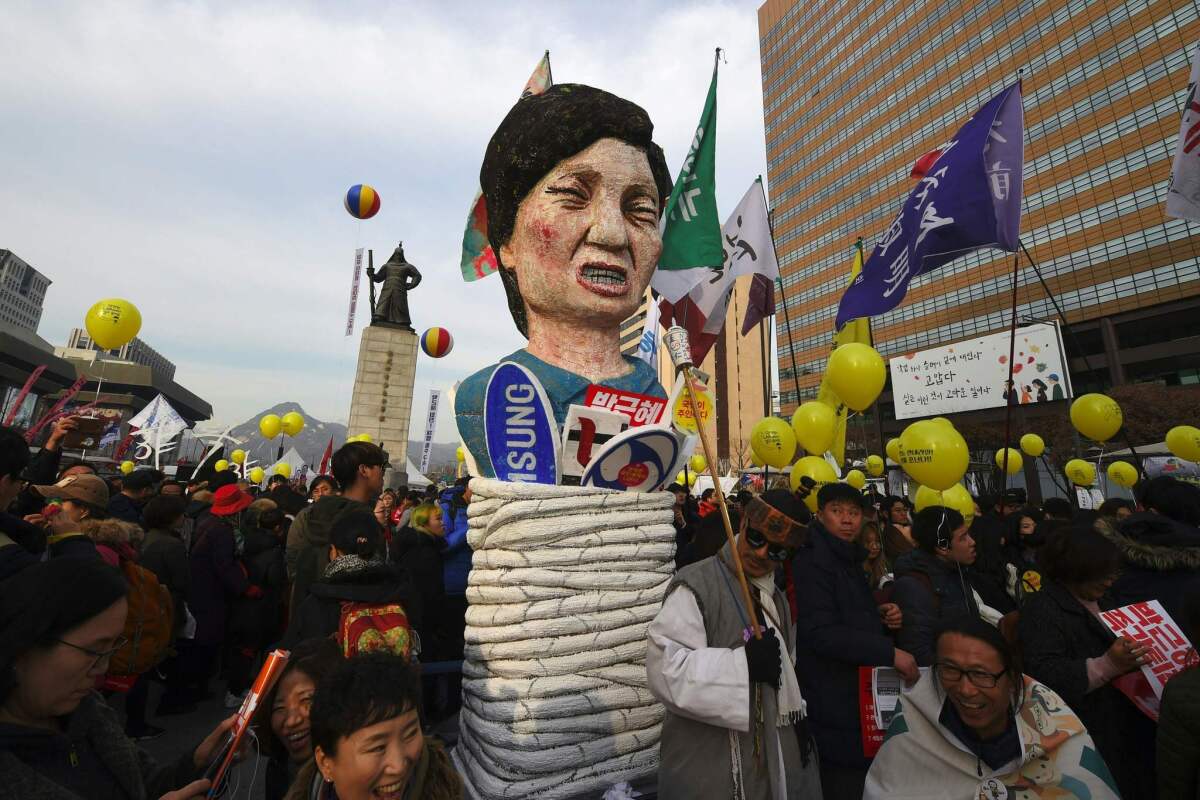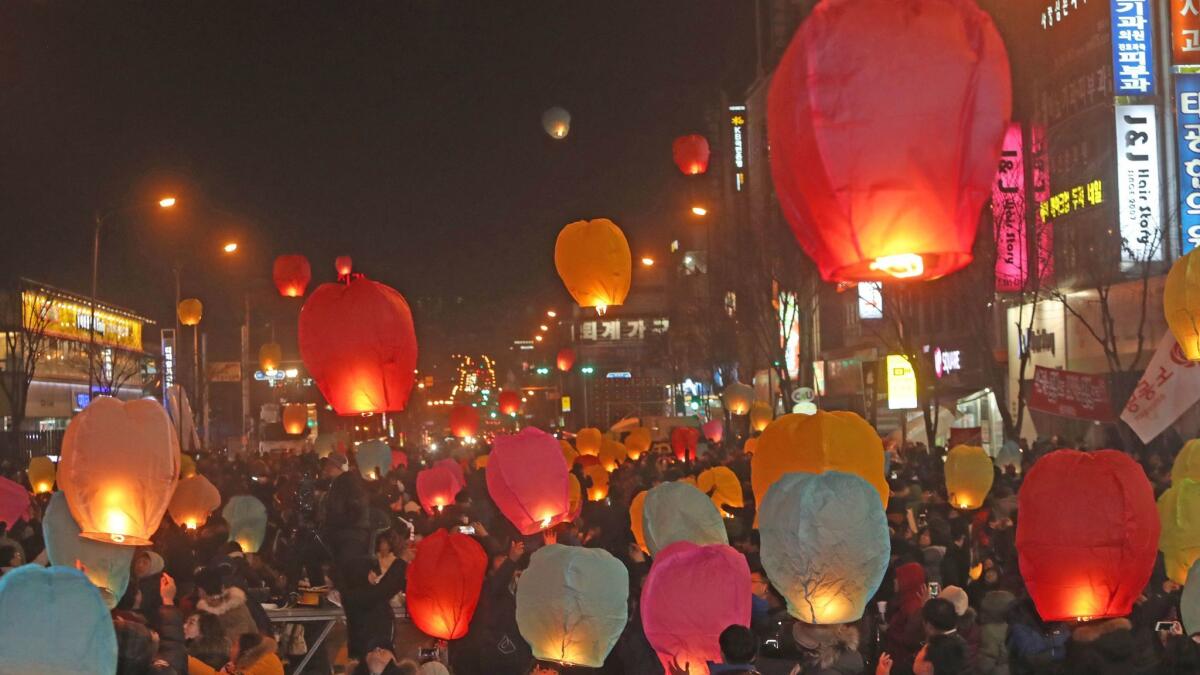This could be the week that ends Park Geun-hye’s presidency in South Korea

- Share via
Seoul — South Korean president Park Geun-hye, mired in an influence-peddling scandal and facing abysmal public-approval ratings, has apologized publicly three times and even hinted about leaving office early in an effort to stave off impeachment.
Yet the pressure continues building — and events this week could ultimately decide her fate.
South Korea’s national assembly is expected to decide on Friday whether to impeach Park. Before then, lawmakers plan to host hours of potentially embarrassing public hearings about the recent scandal, in which the president’s longtime confidant has been criminally charged with corruption.
Some in the president’s own party appear committed to tipping the scales against her, after days of vacillation. Unless she pledges to step aside and allow an early presidential election, they say, the bloc intends to join critics in voting to remove her from office. But few know what Park might do. Last week, she pledged to step down if the national assembly settled on a plan for the transition of power — a move that hasn’t led to political consensus.
“It’s pretty clear that she’s playing for time, and it’s pretty clear that the opposition and her own party have so many different factions that it was incredibly smart to throw out this ploy,” said David Kang, an international relations professor at USC who directs the university’s Korean Studies Institute.
Over the weekend, protesters again filled the streets of Seoul and other cities, demanding the president’s ouster.
I thought she would apologize more, and show more of a repentant attitude. But it’s all excuses, all denials. ...
— Lim Ho-hyun, who joined the protest against Park Geun-hye
Police estimate as many as 320,000 people, toting candles and chanting against the president, crowded Seoul’s central public square throughout the day and night on Saturday — the largest official estimate of an anti-Park rally yet. Organizers say the turnout was closer to 1.7 million, and that as many as 2.3 million demonstrated across the country.
“The president must step down and, at this point, it’s not about resigning with honor,” said Kim Eun-jin, 28, a woman who attended Saturday’s massive rally in Seoul, her first such event. “It’s at the point where the people need to drag her out of office.”
Such sentiment is common at the rallies, where the anger centers on Park’s onetime confidant, Choi Soon-sil, and what critics say was her unusual influence with the president.
Prosecutors investigating the case have labeled Park a suspect in a criminal case involving whether Choi had improper access to state secrets and used her influence to extort powerful South Korean businesses. Choi is the daughter of a deceased cult leader whose own influential relationship with Park has been the subject of speculation in South Korea for years.
Park remains immune from standard criminal charges while in office. The case has fueled public sentiment that the president, the daughter of military dictator Park Chung-hee, assassinated in 1979, is an insular leader influenced by a select group of advisors.
Park has refused to cooperate with the investigation. In recent weeks, it has unfolded in vivid detail, with reports about Choi editing political speeches and asking big companies, such as Hyundai and Samsung, for donations to foundations she controlled.
The intense media focus also turned up embarrassing details about the president, including that her office once purchased the erectile dysfunction medication Viagra, reportedly for the president’s altitude sickness. (The drug has a reputation as an off-the-books remedy for altitude problems.)
The scandal has also brought renewed focus on the government’s handling of the Sewol ferry disaster in 2014, in which more than 300 people died, many of them high school students.
The president, elected in 2012 to a single five-year term, has faced criticism for her tone-deaf reaction to the tragedy — an intensely embarrassing and traumatic incident for many South Koreans. Park did not react publicly to the ferry sinking for several hours, prompting rumors about her whereabouts.
The incident still stings for many South Koreans. Some at the rally on Saturday said the latest scandal confirmed their concerns about what they see as an imperious leadership style.
For Park, whose popularity had been eroded by other confounding political episodes, time might be running out. Her most-recent approval ratings have been at about 10% or less, depending on the survey.
A small group of members of her Saenuri Party now appear resolved to force Park to announce that she intends to step down in April, triggering a new presidential election in June. That would give the party enough time to heal from scandal and field a candidate with some chance of maintaining the presidency.
If no agreement can be reached, the prospect of an impeachment vote seems likely, though its outcome isn’t certain, an opposition leader said Monday. If adopted, the impeachment would temporarily remove Park from office while a constitutional court has 180 days to determine whether there is cause to make the effort permanent.
Park had been scheduled to leave office in early 2018 after an election in December 2017.
Rep. Choo Mi-ae, the head of the opposition Democratic Party, said she would not support an extended resignation timetable for Park. She said over the weekend that the public’s cry for impeachment should be heard.
“We urge Saenuri lawmakers to join the move for impeachment in accordance to the public’s voice and conscience,” Choo said in a written statement.
Those voices have been many — and loud. Millions have taken to the streets in recent weeks to call for the president’s ouster. In largely peaceful rallies, filled with signs and candles, South Koreans have expressed outrage not seen since the late 1980s, when the military-controlled government began allowing free presidential elections in response to protests.

The anger has hardly been blunted by Park’s apologies and statements that she never acted in her own personal interest.
“I thought she would apologize more and show more of a repentant attitude,” said Lim Ho-hyun, 38, who brought his children, ages 4 and 8, to the most recent rally in Seoul. “But it’s all excuses, all denials, all one big claim that it has nothing to do with her.”
Not everyone is convinced this week signals the end for Park.
Joung Hwang, a professor at Seoul’s Hankuk University of Foreign Studies Law School, said this week could be decisive, but the timing of an early exit for Park remains unclear — in part because of factors outside politics, such as winter.
“The people’s anger is quite palpable. It’s not something that politicians can control right now,” he said. “A big factor is going to be the weather. Will it affect the rallies? How long is the people’s anger going to last?”
Stiles is a special correspondent
ALSO
Japanese leader Shinzo Abe to visit Pearl Harbor with Obama
South Korean President Park Geun-hye says she’ll resign if a safe path from power can be found
Trump’s call with the Taiwanese president was his latest break from diplomatic norms
More to Read
Sign up for Essential California
The most important California stories and recommendations in your inbox every morning.
You may occasionally receive promotional content from the Los Angeles Times.











